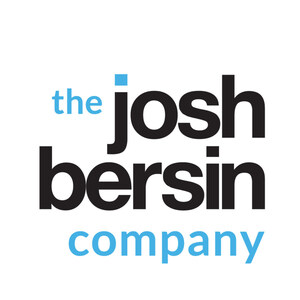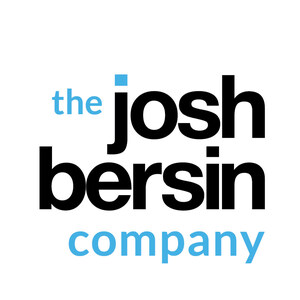- New Josh Bersin Company research describes AI's impact on jobs and work: not replacing people, but enabling every job to be upgraded
- Impact of AI will be driven by massive job redesign and organizational transformation, which requires extensive reskilling and internal reorganization
- "Superworking" concept rounds out Josh Bersin Company's vision of dynamic organizations using Systemic HR™ to enhance talent density and become "Irresistible"
OAKLAND, Calif., Jan. 14, 2025 /PRNewswire/ -- The world's most trusted human capital advisory firm, The Josh Bersin Company, today releases innovative research on what will be the most important workplace change for the 2020s: the rise of the human, but AI-empowered, "Superworker."
Its new research defines a "Superworker" as an employee who is empowered through AI to deliver orders of magnitude greater productivity, creativity, or service. And, if driven and supported by job and organization design, the research shows how every employee can participate in the growth this will bring.
According to The Josh Bersin Company, there's no question that AI can turbo-charge organizational performance. However, their research shows that this will not happen by reducing headcount, but rather by super-powering employees in many new ways. The firm emphasizes that we are entering a massive period of business re-engineering.
The report, The Rise of the Superworker: HR and Leadership Predictions and Imperatives for 2025, based on hundreds of interviews, explains how AI transformation does not only improve speed to market, quality, creative output, and access to data, but it also empowers individuals to reach new levels of contribution and value.
Companies that embrace the Superworker model, the report explains, will outpace and outperform those that simply use AI to reduce payroll.
The consulting firm further emphasizes that AI as a "work augmentation tool" alone will deliver limited returns. While companies are excited about "copilots," the big improvements will come as organizations build new business processes and multi-step AI agents, leading to exponential growth in productivity and quality.
Josh Bersin Company's research also argues that most of the limitations to growth will be people issues, not technology. Building a Superworker company requires a focus on process redesign, culture, internal development, empowerment, and worker creativity. The idea that AI will "replace" the average worker is wrong: humans will be empowered and liberated by these systems.
Several factors have rapidly converged to give rise to the Superworker: widespread labor shortages across major regions, steady post-pandemic economic growth driving high demand, low unemployment due to extensive hiring, and increased transparency around skills.
To sustain this growth, the research firm emphasizes the need to carefully manage this next phase of corporate transformation. While off-the-shelf AI products are still emerging, these tools are still immature. As companies experiment with these systems, the research argues, organizations should creatively and quickly focus on the new roles that add value, manage, and train these systems.
Josh Bersin Company also finds that while many routine jobs will go away, Superworker companies create more new roles as a result. This will increase wages and improve standards of living, driven by the productivity bonus of becoming Superworker organizations.
The firm notes that they have already seen HR teams, engineering teams, and sales teams who are using AI to radically increase output by orders of magnitude by training and realigning people, not letting people go.
Why "Superworker"?
The Josh Bersin Company uses this term to capture the idea that high-powered AI platforms will enable people to add value in even greater ways, not only reduce and eliminate jobs.
Why Will 2025 Be the Year of the Superworker?
The Josh Bersin Company forecasts that 2025 will see a major workplace transformation, fueled by AI—especially "Agentic" AI. This shift moves beyond simple task automation to providing autonomous, data-driven solutions that integrate smoothly into workflows.
The Urgency of AI-Driven HR and Organizational Design
HR must guide organizations through this revolution, reshaping productivity and success, by working with business teams to rethink work processes. The research describes a new discipline called "productivity-based organization design," which will help companies quickly adopt AI platforms for re-engineered levels of performance.
Four Stages to AI Transformation
The research describes four stages of AI business transformation: assistance, augmentation, replacement (of routine work), and autonomy (self-operating business processes). Today most employees are already experimenting with AI assistants: the next three stages are coming quickly, including digital twins and self-optimizing agents.
Superworker Productivity = Business Gains
Findings prove that AI boosts productivity by 30% to 400%, with human-AI collaboration doubling output across industries. As AI use scales, organizations must redesign workflows, upskill employees, and ensure responsible implementation to address concerns around intellectual property, data privacy, and accountability.
Intense Focus on Organizational Talent Density
The future of work will focus on "talent density" over workforce size, with companies focused on hiring and developing people with deep skills. Firms like Google, Netflix, and Klarna that generate over $1 million per employee, showcase the benefits of high talent density. Given labor shortages, the days of "growth by hiring" will be replaced by "growth through talent quality and culture."
Rising Expectations and Challenges
AI will increase demand for IT, data, and software specialists, raising compensation expectations. Both technical and non-technical roles will need AI skills, disrupting HR practices. Today AI-related IT jobs command 30-50% higher levels of pay and this will continue.
Evolving Talent Models and Leadership
HR must promote dynamic career paths and reward technical experts as managerial roles shrink. Leaders should embrace AI, focus on job redesign, and balance innovation with execution. In the new war for talent, employee engagement, retention, and career growth will be more important than ever.
The Need to Invest in HR and Technology
AI-driven HR tools are maturing, offering deep talent insights and personalized learning. To succeed, companies must invest in next-generation HR tools to help. AI platforms, like The Josh Bersin Company's Galileo™ and many others, are helping HR with skills analysis, hiring, job redesign, and organizational development.
The 2025 Superworker CHRO To-Do List
Three key questions will drive AI's integration in 2025:
- Where can AI boost productivity and accelerate speed to market?
- What role will our people play as systems evolve?
- How should we redesign jobs and organizations to maximize potential?
CHROs must be at the heart of these discussions, ensuring human creativity, empathy, and judgment remain central. As routine jobs may disappear, the CHRO should lead the redesign of roles and workflows to empower Superworkers, guiding AI decisions and maintaining human oversight.
Global industry analyst and CEO of The Josh Bersin Company, Josh Bersin, says:
"As we enter the second half of the decade, multifunctional AI agents will reshape companies and roles, forcing HR teams to rethink many parts of the talent management puzzle.
"Ultimately AI business transformation will be led by companies focused on people, not just technology. Even as AI automates more routine work, it is the human value-add that creates competitive advantage. This is the essence of the Rise of the Superworker."
A comprehensive set of Superworker analyses and plans has been compiled to assist CHROs in advancing these ideas. More information about The Rise of the Superworker: HR and Leadership Predictions and Imperatives for 2025, is available here, while the full report is exclusively available to Josh Bersin Company customers using Galileo, Bersin Academy, and Corporate Membership.
To support HR professionals across all specialties and experience levels in navigating the massive job redesign and reengineering challenge ahead, the Bersin Academy has recently launched its latest learning course, Building a Skills Strategy That Works, designed to equip organizations with the tools to become skills-ready.
About The Josh Bersin Company
The most trusted human capital advisors in the world. More than a million HR and business leaders rely on us to help them overcome their greatest challenges.
Thanks to our understanding of workplace issues, informed by the largest, and most up-to-date data sets on workers and employees, we give leaders the confidence to make decisions in line with latest thinking and evidence about work and the workplace. We're great listeners, too. There's no one like us, who understands this area so comprehensively and without bias.
We help CHROs and CEOs be better at delivering their business goals. We do that by helping you to manage people better. We are enablers at our core. We provide strategic advice and counsel supported by in-depth research, thought leadership, and unrivaled professional development, community and networking opportunities.
Our offerings include the industry's leading AI-powered HR expert assistant, Galileo™, fueled by 25 years of in-depth Bersin research, case studies, benchmarks, and market information.
We empower our clients to run their businesses better. And we empower the market by identifying results-driven practices that make work better for every person on the planet.
For more information, visit www.joshbersin.com or email [email protected].
SOURCE The Josh Bersin Company

WANT YOUR COMPANY'S NEWS FEATURED ON PRNEWSWIRE.COM?
Newsrooms &
Influencers
Digital Media
Outlets
Journalists
Opted In





Share this article